
Understanding the Role of Speech Therapy in Teen Social Development
As teens navigate a complex social landscape, effective communication becomes crucial. Speech therapy plays a pivotal role in supporting adolescents facing challenges with social interaction, helping them develop the skills necessary for meaningful relationships and successful social participation. This article explores how speech-language pathologists facilitate social communication improvements in teens, the techniques involved, and the benefits for their overall well-being.
What is Social Communication and Its Importance During Adolescence
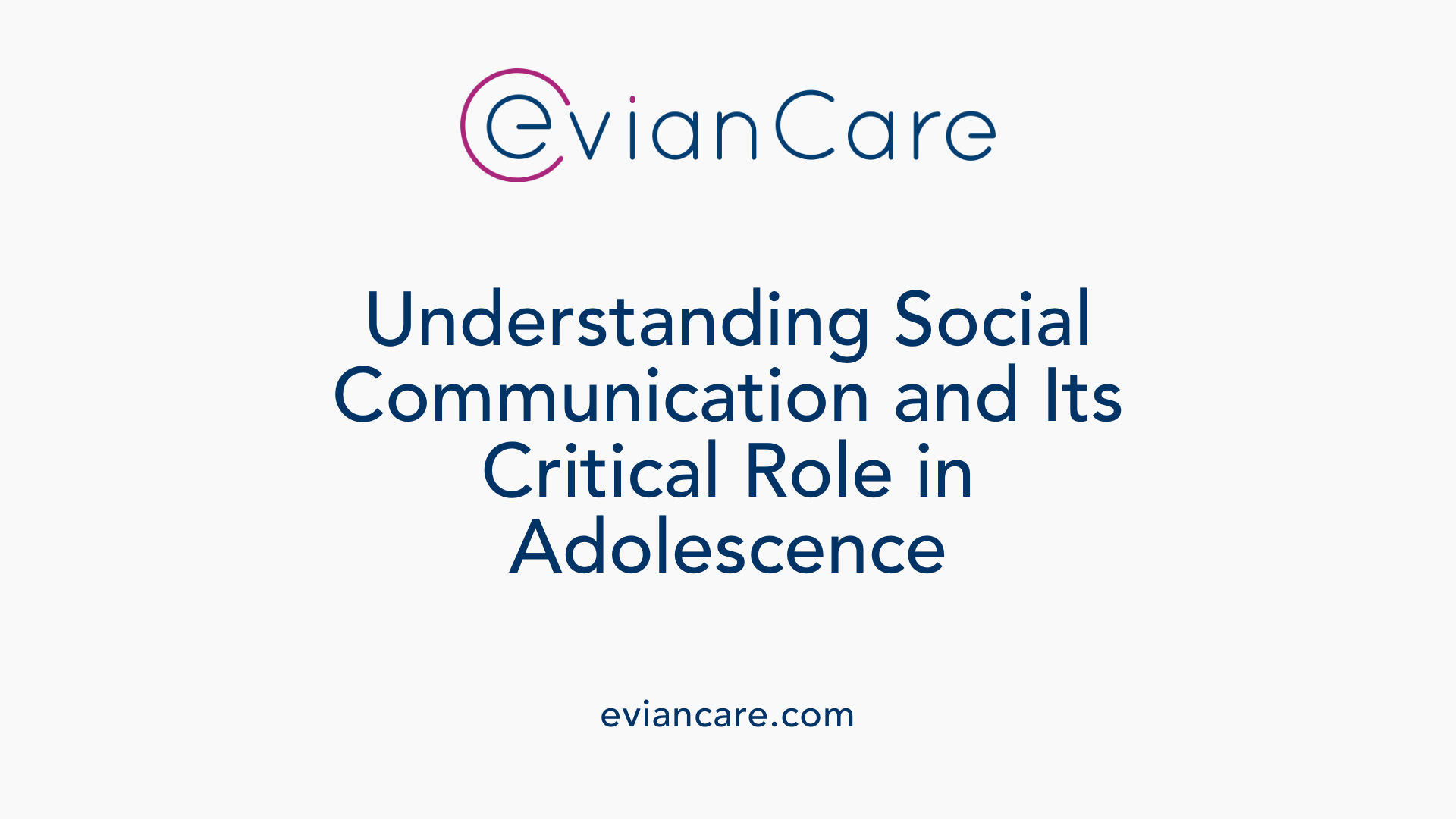
What is social communication and how can speech therapy improve it in teens?
Social communication refers to the way we use language and nonverbal cues to interact effectively with others. It encompasses understanding social rules, such as taking turns in conversation, recognizing humor or sarcasm, and adjusting language depending on the listener or situation.
During adolescence, social communication skills become increasingly important as teens navigate complex social environments like school, extracurricular activities, and friendships. Challenges in social communication, often seen in individuals with social pragmatics disorder or autism, can lead to difficulties in building relationships, feeling socially accepted, and participating fully in social or academic settings.
Speech-language pathologists (SLPs) play an essential role in supporting teens with social communication difficulties. They conduct thorough assessments to identify specific challenges and develop personalized therapy plans. These plans often include practicing conversation skills through role-playing, analyzing social scenes, using social stories, and engaging in peer-mediated activities. These interventions help teenagers understand social cues, interpret others' emotions, and respond appropriately.
By targeting these social understanding skills, speech therapy enhances teens' confidence and ability to connect with peers. The goal is to promote authentic, functional communication that supports meaningful relationships and social participation. Ultimately, improved social communication can lead to better academic performance, reduced anxiety, and increased involvement in community activities, preparing teens for successful adult interactions.
Additional aspects of social communication development
| Component | Description | Example Activities |
|---|---|---|
| Verbal language use | How language varies by context | Practice dialogues for different settings |
| Nonverbal cues | Body language, facial expressions | Role-playing facial expressions or gestures |
| Listening skills | Attentiveness and interpretation | Listening exercises with social stories |
| Social rules | Cultural and situational norms | Social stories and peer modeling |
| Perspective-taking | Understanding others' viewpoints | Activities that promote empathy |
Supporting social communication development through speech therapy not only improves teens' ability to communicate effectively but also boosts their social confidence, helping them build and maintain meaningful relationships.
Signs of Social Communication Difficulties in Teenagers
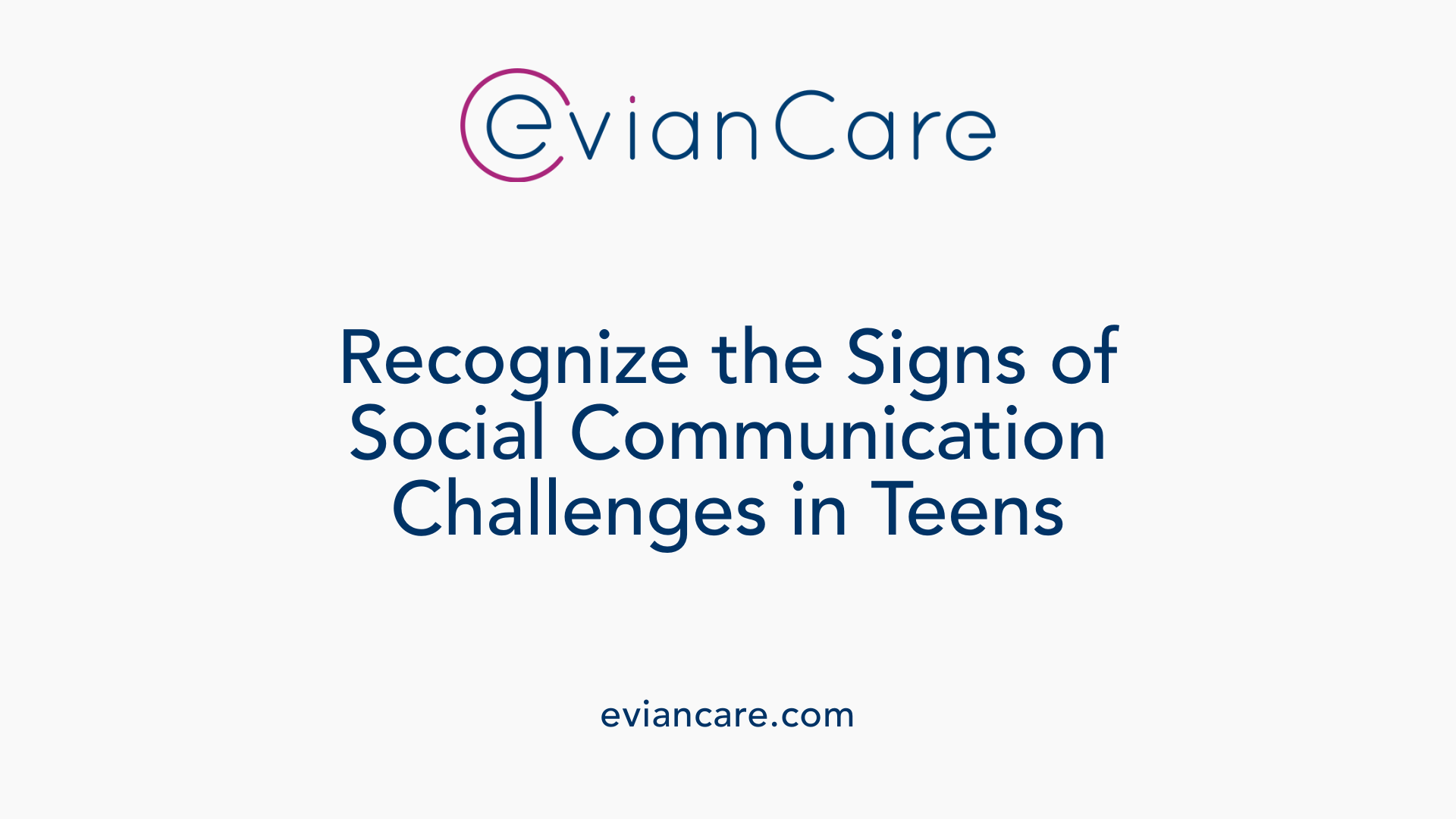
What are common signs of social communication difficulties in teenagers and how can therapy help?
Teenagers with social communication challenges often display a range of behaviors that can affect their interactions and social success. They may struggle with initiating conversations or maintaining dialogue, making it hard for them to build and sustain friendships. Understanding social cues, such as facial expressions, tone of voice, or body language, can be particularly difficult, leading to misunderstandings or awkward interactions.
Difficulty interpreting humor, sarcasm, and figurative language can cause confusion and miscommunication. These teens might also find it hard to adjust their speech depending on the social context—for example, knowing when to be formal or informal.
In social settings like school, extracurricular activities, or at home, these individuals may experience social isolation, frustration, or anxiety due to their struggles.
Therapy can play a vital role in helping teenagers overcome these hurdles. Speech-language pathologists use various techniques, including social skills training exercises, social stories, and role-playing scenarios, to improve pragmatic language skills. Video modeling and structured conversations help teens practice real-life interactions safely.
Personalized strategies, such as social scripts tailored to individual needs and video feedback, aid in transferring skills from therapy to everyday situations. Collaboration with family, teachers, and peers enhances this process, ensuring generalization of learned skills.
Ultimately, effective therapy supports teens in understanding social norms, engaging more confidently with others, and forming meaningful relationships. This developmental progress fosters not only better social functioning but also contributes positively to their mental health and overall well-being.
| Signs of Social Communication Difficulties | Specific Challenges | Impact on Social Life |
|---|---|---|
| Trouble initiating or maintaining conversations | Interrupting, not replying, disjointed dialogue | Social isolation, loneliness |
| Difficulty interpreting social cues | Missing non-verbal signals, misunderstanding jokes | Misunderstandings, conflicts |
| Challenges with humor or figurative language | Literal interpretations, confusion | Frustration, social withdrawal |
| Adjusting communication style | Speaking formally or informally inappropriately | Social awkwardness |
| Struggling with friendship skills | Trouble making or maintaining friends | Social rejection, low self-esteem |
Recognizing these signs early and engaging in targeted intervention can significantly improve a teen’s ability to navigate social environments successfully, building confidence and emotional resilience.
Approaches and Techniques Utilized in Speech Therapy for Teens
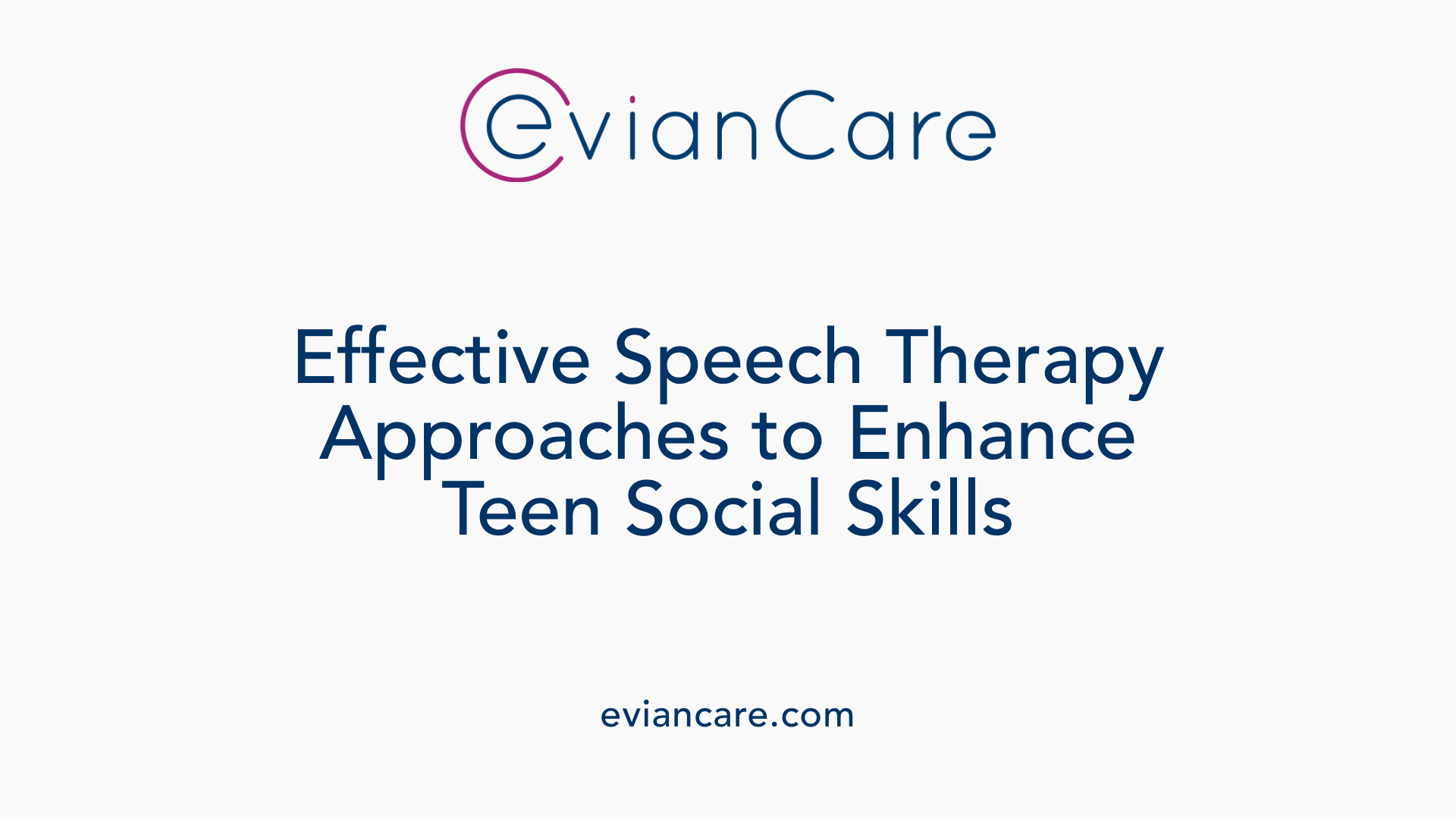
What approaches and techniques are used in speech therapy to improve social communication in adolescents?
Speech therapy for teenagers employs a broad range of methods tailored to boost social interaction skills and pragmatic language use. These approaches blend traditional behavioral strategies with innovative tools to ensure engagement and real-world applicability.
One common technique involves structured social skills training groups where teens learn and practice essential skills such as initiating conversations, turn-taking, and understanding social cues. These groups often incorporate activities like role-playing, social stories, and comic strip conversations, which help clients grasp social concepts in a memorable way.
Role-playing and modeling are fundamental components of therapy sessions. Therapists act out social situations and demonstrate effective behaviors, providing teens with clear examples to emulate. For instance, a therapist might simulate a social interaction like starting a phone call or resolving a disagreement, encouraging the teen to practice responses in a safe environment.
In addition, visual supports play a crucial role. Visual tools such as social stories, picture cue cards, and emotion charts help teens interpret facial expressions, tone of voice, and body language. Technology-based tools, including apps and video modeling, offer interactive ways for teens to observe social dynamics and rehearse appropriate responses.
The use of digital platforms also facilitates consistent practice outside therapy sessions. Virtual therapy sessions, online social skills modules, and video feedback serve to generalize skills across different settings, making the learning practical and sustainable.
A personalized approach is vital. Therapists assess each teen’s specific challenges and strengths, tailoring interventions accordingly. Emphasizing authentic communication and social nuances supports genuine connection, particularly for autistic teens who benefit from neurodiversity-affirming practices.
Overall, combining direct instruction, role-playing, visual supports, and technology creates a comprehensive framework. This equips teens with the skills necessary to thrive socially in environments like school, work, and social gatherings, fostering confidence and independence.
The Role of Speech-Language Pathologists in Fostering Social Skills in Teens
What role do speech-language pathologists play in supporting social communication development in teens?
Speech-language pathologists (SLPs) are instrumental in helping teenagers improve their social communication skills. They begin with a thorough assessment of the teen's conversational abilities, understanding social cues, nonverbal communication like gestures and facial expressions, and understanding humor or sarcasm. This evaluation helps identify specific challenges, such as difficulties with maintaining eye contact, interpreting social cues, or progressing in pragmatic language skills.
Based on the assessment, SLPs craft personalized intervention plans tailored to each teen's needs and interests. These plans often include a mix of practical activities like role-playing, social stories, and peer group exercises to practice real-life social interactions. For example, teens might work on initiating conversations, taking turns, or understanding different social contexts.
SLPs also utilize techniques such as modeling appropriate language use, providing visual supports, and implementing video feedback to enhance learning. They emphasize teaching skills through engaging methods that resonate with teens, fostering better understanding and more natural application.
Further, SLPs work collaboratively with families, teachers, and peers to create a supportive environment that promotes social growth. They provide guidance and training on how to reinforce social skills at home and in educational settings. This teamwork ensures consistency and maximizes the teen's progress.
In addition to direct therapy, SLPs educate caregivers and educators on the importance of understanding social pragmatics, recognizing social cues, and encouraging positive social interactions. Such support can boost a teen’s confidence in social situations, reduce stress, and promote more meaningful connections with friends and peers.
Ultimately, SLPs help teenagers develop vital communication competencies that are essential for successful social engagement, academic success, and future relationships. Their comprehensive, individualized approach aims at fostering authentic, functional communication skills that empower teens to navigate the social complexities of adolescence with confidence.
Effectiveness of Speech Therapy in Enhancing Teen Social Skills
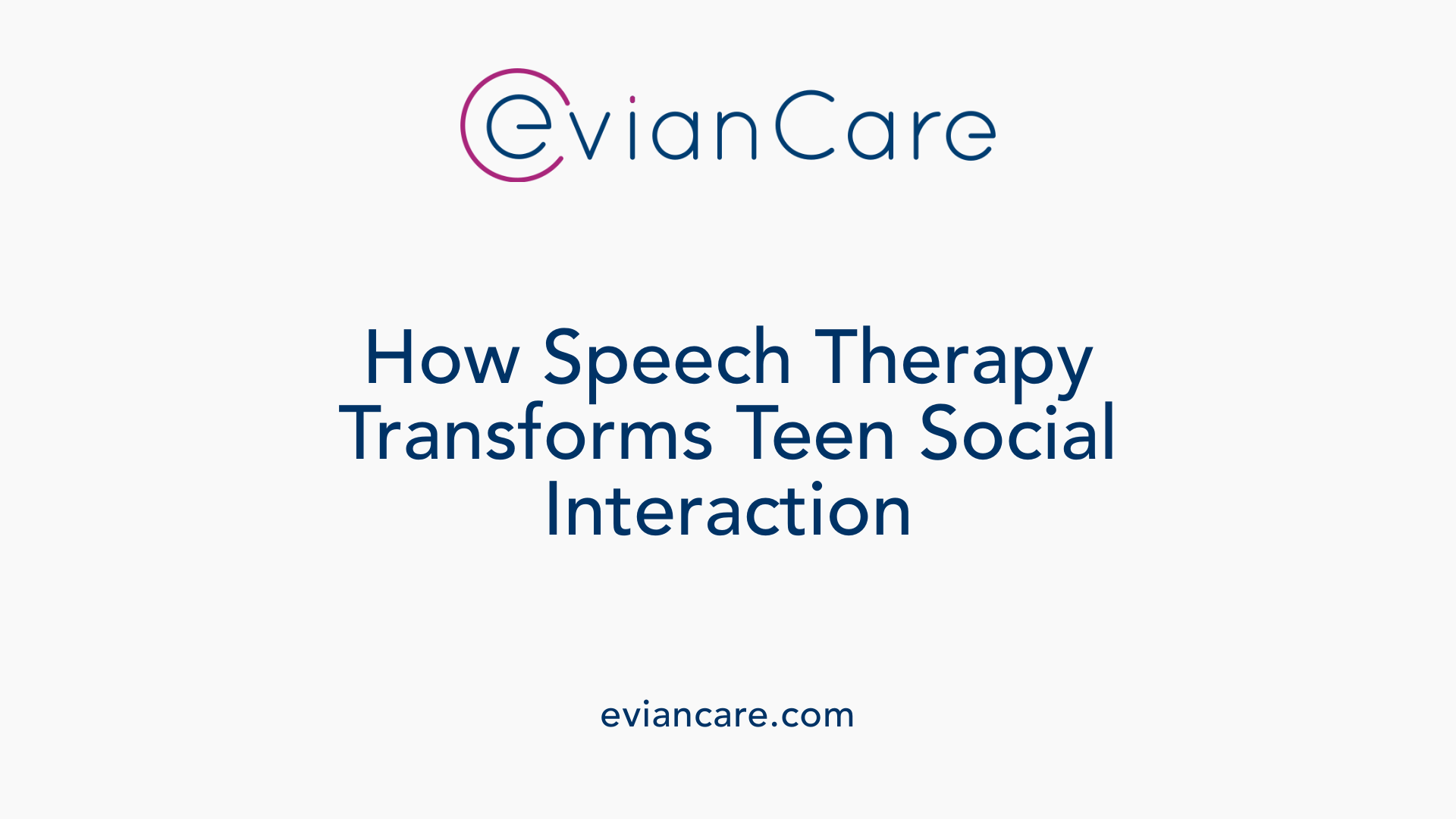
How effective is speech therapy in helping teenagers overcome social communication challenges?
Speech therapy plays a significant role in improving social skills among teenagers who face communication difficulties. This form of therapy targets pragmatic language skills, such as initiating conversations, maintaining eye contact, interpreting social cues, and understanding non-literal language like sarcasm or idioms. For teens, especially those on the autism spectrum or with social pragmatics disorder, this intervention can help them navigate complex social environments with greater confidence.
Research evidence supports the effectiveness of tailored speech therapy programs. Early intervention, often starting during early childhood, has shown promising long-term benefits, with continued therapy during adolescence leading to further improvements. Techniques such as role-playing, social stories, video modeling, and pragmatic language exercises are commonly used to facilitate meaningful skill acquisition.
Moreover, therapy that's customized to individual needs — considering specific social challenges, personality, and interests — tends to produce better outcomes. Active involvement from caregivers and educators enhances the generalization of skills to real-world situations. As a result, teens undergoing speech therapy often experience better peer relationships, greater success in academic and social settings, and increased self-esteem.
Overall, evidence points to speech therapy being an effective tool for helping teens overcome communication hurdles, fostering social confidence, and promoting ongoing social success across school, work, and community environments.
The Potential for Late Intervention and Support for Adolescents
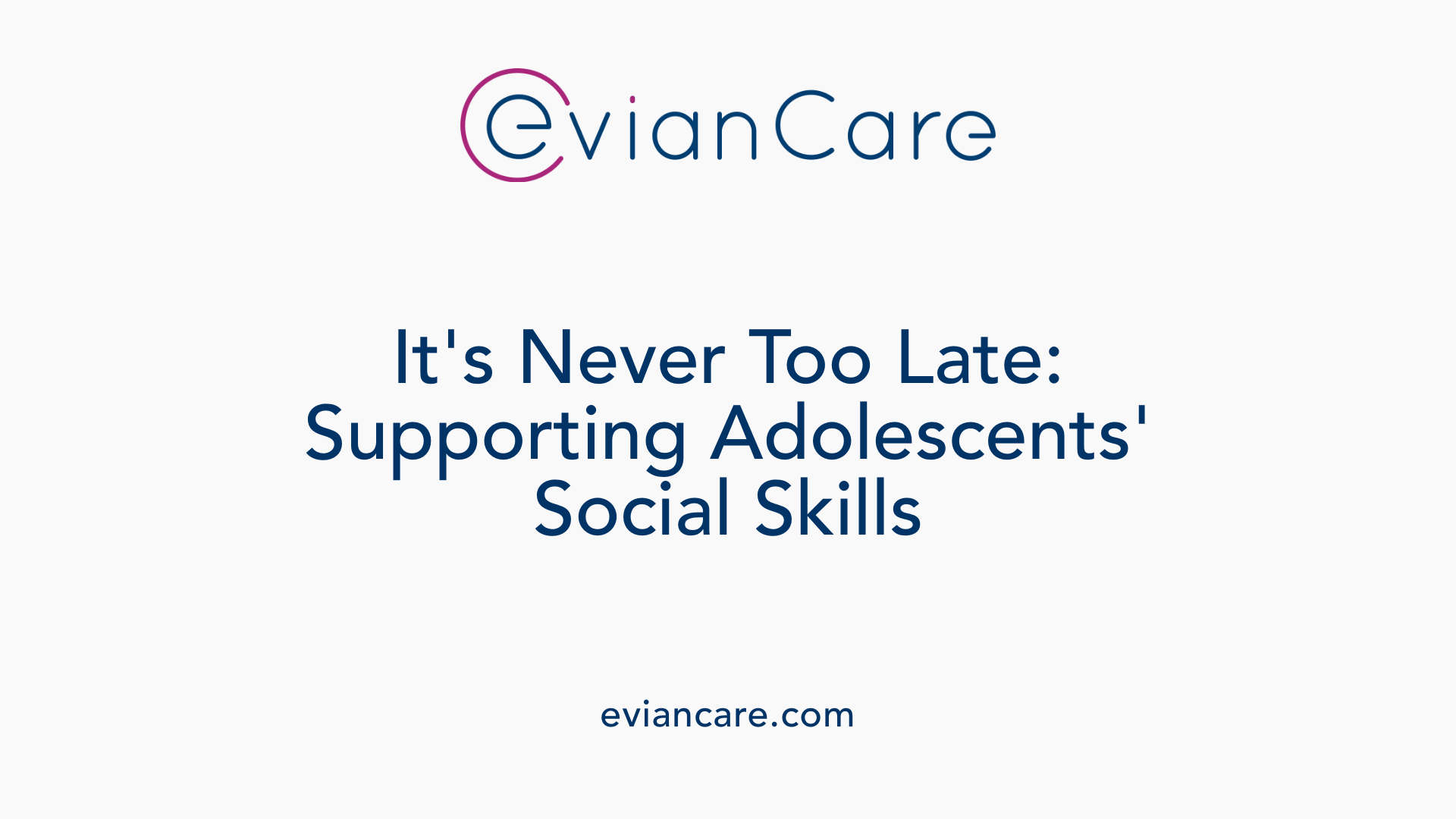
Is it too late for teenagers to benefit from speech therapy if they experience social communication difficulties?
Many believe that early intervention is the best approach for addressing social communication challenges. However, research indicates that it is never too late for teenagers to gain benefits from speech therapy. Thanks to the brain's ability to adapt and change, known as neuroplasticity, adolescents can still make significant progress in their social communication skills.
Even if a teen has struggled with social cues, conversation initiation, or maintaining relationships for years, starting therapy later can still yield meaningful improvements. These improvements include increased confidence, better peer relationships, and enhanced emotional understanding.
While early treatment offers advantages such as preventing secondary issues like anxiety or social withdrawal, later intervention is valuable for catching up and developing essential social skills. Tailored therapy emphasizes real-life application, helping teens interpret social cues, express themselves clearly, and navigate complex social environments.
In summary, age is not a barrier to benefiting from speech therapy. Teens who seek support later in adolescence can still experience positive changes that boost their overall well-being and social integration.
Supporting Social Development: Parental and Educational Involvement
What can parents and educators do to support social communication skills in teenagers?
Supporting teenagers in developing strong social communication skills involves creating opportunities for practice, modeling positive behavior, and fostering an inclusive environment. Encouraging active participation in activities such as clubs, sports, or community service helps teens engage with peers in real-world social settings, allowing them to practice turn-taking, conversation initiation, and emotional understanding.
Parents and teachers can play a vital role by modeling effective communication. This includes using clear body language, appropriate tone of voice, and demonstrating active listening. These behaviors serve as practical examples for teens to imitate.
Role-playing social situations and practicing conversation skills in guided activities, such as speech therapy sessions or informal family discussions, can bolster a teen’s ability to navigate various social contexts. These exercises help improve skills like changing topics smoothly, interpreting social cues like facial expressions or sarcasm, and responding appropriately.
Creating a supportive environment that emphasizes empathy, respect for diversity, and acceptance builds a foundation for healthy social interactions. This includes monitoring and guiding online interactions, promoting respectful online communication, and addressing cyberbullying.
Furthermore, involving teens in community-based activities such as volunteering, mentorship, or cultural events develops their social awareness, empathy, and leadership skills. These experiences deepen their understanding of social norms and enhance their confidence in social situations.
Overall, proactive involvement from parents and educators, combined with positive modeling and inclusive practices, provides teenagers with the tools necessary for social success and emotional well-being.
Building Future-Ready Communication Skills in Teens
Empowering teenagers with strong social communication skills through speech therapy is an investment in their personal, academic, and professional futures. With a range of targeted approaches tailored to individual needs, speech-language pathologists can help teens interpret social cues, engage more confidently in conversations, and build lasting relationships. Involving families and schools in fostering supportive environments further enhances these skills, ensuring that adolescents are prepared to navigate an increasingly social world with competence and confidence. Regardless of when intervention begins, the potential for growth remains vast. As awareness of social communication challenges increases, so too does the opportunity to equip teens with the vital skills they need to thrive.
References
- Social Communication - ASHA
- Supporting Social Communication Skills in Older Children and Teens
- Online Speech Therapy for Teenagers | Communication Skills
- Speech Therapy for Teenagers: Expert Advice for Parents
- How Speech Therapy Can Improve Social Communication Disorders
- Effective Strategies for Enhancing Social Skills in Children with Autism
- How Speech Therapy Can Improve Social Communication Skills
- Social Skills Training for Teenagers - A Speech Therapy Guide
- How Speech Therapy Helps Children Improve Communication
- Social Skills Development - Talkshop Speech Pathology












